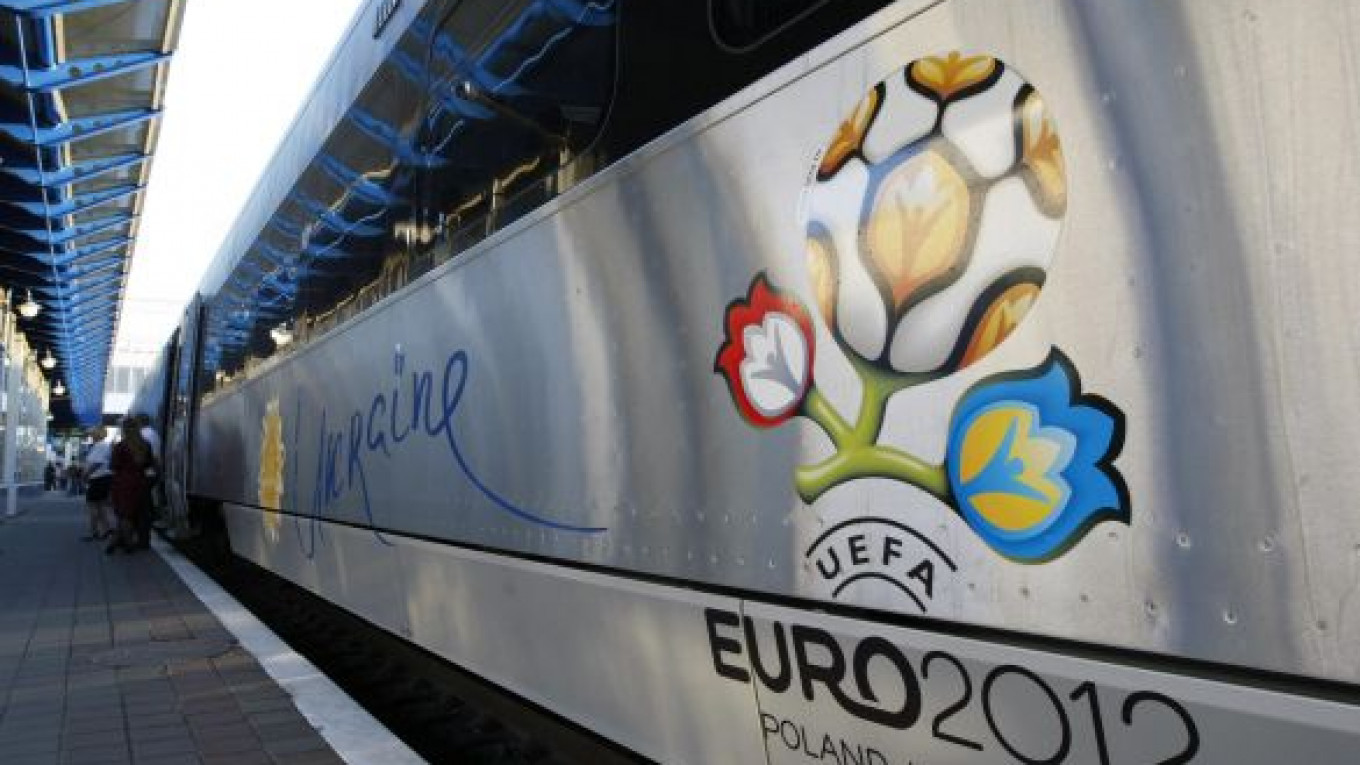KIEV — Ukraine may never recover all of the billions of dollars it has spent to co-host next month's European football championship, and the outlay might complicate its chances of servicing its debt.
The staging of the monthlong Euro 2012 tournament has consumed $13.4 billion, including $6.6 billion from state coffers.
That is unlikely to make the country any more inviting for foreign investment, analysts say.
And despite the hopes of tour operators and the authorities themselves, once the competition taking place in four Ukrainian cities is over and the fans have gone home, it is by no means certain that Ukraine will be a new European tourist destination.
The mathematics of financing Euro 2012, which Ukraine is co-hosting with Poland, is crucial.
The country faces $11.9 billion in debt obligations this year, $5.3 billion of which is denominated in foreign currencies, making it sensitive to movements on foreign exchange markets.
The issue looms large because in June the government has to repay a $2 billion loan to Russia's VTB Capital and $500 million in outstanding eurobonds.
Kiev has failed to agree on a new credit line with the International Monetary Fund and has for more than a year been unable to issue eurobonds to help cover state spending, which has spiked ahead of October's parliamentary elections.
The jailing of opposition leader Yulia Tymoshenko, sentenced to seven years in October for abuse of office, has hurt confidence in Ukraine's creditworthiness and led to a boycott of the sporting event by some top European politicians.
"Ukraine will not receive any financial income or significant economic impact from co-hosting the Euro 2012 championship," said Andriy Kolpakov, managing partner at analytical group Da Vinci. "And any possible improvement in image has run up against internal politics and the European Union's reaction to it."
Ukraine's high level of corruption has scared off some foreign investors, while skyrocketing hotel prices have made many football fans either cut short their stay or skip it altogether and opt to follow their team's fortunes on television.
Based on the government's program, the state has spent some $6.6 billion from its budget on Euro 2012 preparations, a total that rises to $13.4 billion once input from state companies and private investors is included.
"In effect, the [state] budget took on the additional debt burden, and taxpayers for many years to come will be paying for the Euro soccer holiday," said Erik Nayman at brokerage Capital Times.
Analysts at Da Vinci forecast financial losses suffered from hosting the championship could total $6 billion to $8 billion.
Ukraine's central bank sees $1 billion in capital flowing into the country from visitors who will spend on restaurants, hotels and souvenirs during the monthlong championship in Kiev, Donetsk, Kharkiv and Lviv.
But some see lesser benefits, and Da Vinci estimates the influx at no more than $800 million.
Ukraine's authorities argue that much of the spending was necessary anyway.
"Without international airports and transport infrastructure, the country will not receive any foreign investment," said Deputy Prime Minister Borys Kolesnikov, charged with preparing for the championship.
But not everyone agrees.
"There is no direct correlation. Foreign direct investment will increase only by improving the investment climate, that is, with less bureaucracy," said Alexander Valchishen at brokerage Investment Capital Ukraine.
Whether the money has been well spent is also a moot point.
"Despite years of preparation, a decent tourist infrastructure and facilities have not been created to entice the majority of the fans to return to Ukraine," Kolpakov said. "You can forget about a serious surge of interest in Ukraine from Western tourists."
So far there seems little evidence that foreign direct investment is following the government's spending.
According to the State Statistics Service, foreign direct investment into Ukraine last year was $4.6 billion, down from $4.7 billion in 2010 and significantly less than the $8 billion that Ukraine attracted in 2005 in the wake of the pro-Western Orange Revolution.
Nayman expects a huge debt burden on the budget.
"If we assume a 12 percent interest per annum, that means that about 10 billion hryvna ($1.2 billion) from the budget each year goes just to pay for interest payments. And then, there is still the need to refinance the debt," he said.
Nayman added that around half the state's current domestic debt issued in bonds, or some 80 billion to 90 billion hryvna, can be directly linked to government spending on Euro 2012.
Some analysts say mounting state debt payments along with unclear prospects for government borrowing on world capital markets increase the risk of hryvna instability.
"The government will be making every effort to prevent the collapse of the hryvna before the parliamentary elections," said Vasily Yurchishin, an analyst at the Razumkov Center, a think tank.
A Message from The Moscow Times:
Dear readers,
We are facing unprecedented challenges. Russia's Prosecutor General's Office has designated The Moscow Times as an "undesirable" organization, criminalizing our work and putting our staff at risk of prosecution. This follows our earlier unjust labeling as a "foreign agent."
These actions are direct attempts to silence independent journalism in Russia. The authorities claim our work "discredits the decisions of the Russian leadership." We see things differently: we strive to provide accurate, unbiased reporting on Russia.
We, the journalists of The Moscow Times, refuse to be silenced. But to continue our work, we need your help.
Your support, no matter how small, makes a world of difference. If you can, please support us monthly starting from just $2. It's quick to set up, and every contribution makes a significant impact.
By supporting The Moscow Times, you're defending open, independent journalism in the face of repression. Thank you for standing with us.
Remind me later.






